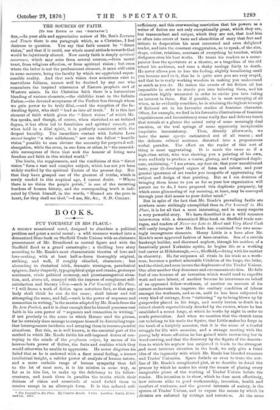THE SOURCES OF FATTH.
[TO THE EDITOR OF THE " SPECTATOR.")
S111,—In your able and appreciative review of Mr. Sen's Lectures and Tracts there is one paragraph which, as a Christian, I feel desirous to question. You say that faith cannot be " direct vision," and that if it could, our whole moral attitude towards God would be injuriously altered. Now surely faith is simply spiritual assurance, which may arise from several sources,—from moral trust, from religious affection, or from spiritual vision ; but even where the latter is not the predominant element, it must still exist in some measure, being the faculty by which we apprehend super- sensible reality. And that such vision does sometimes exist in marvellous fullness, cannot well be doubted by any one who remembers the inspired utterances of Eastern prophets and of Western saints. In the Christian faith there is a harmonious blending of various elements,—the childlike trust in the Infinite Father,—the devoted acceptance of the Perfect Son through whom we gain power to be truly filial,—and the reception of the In- dwelling Spirit, who shall " lead us into all truth." It is this last element of faith which gives the "direct vision " of which Mr. Sen speaks, and though, of course, when cherished as an isolated dogma, it has often led to fanaticism and spiritual conceit, yet when held in a filial spirit, it is perfectly consistent with the deepest humility. The immediate contact with Infinite Love oannot inspire "a wise selfishness," nor can the fullest " beatific vision" possible to man obviate the necessity for perpetual self- abnegation, while the cross, in one form or other, is " the unavoid- able recompense of them that seek the honour of living unto freedom and faith in this wicked world."
The limits, the supplements, and the conditions of this "direct vision" form a vast and complex subject, which has not yet been widely studied by the spiritual Theists of the present day. But that they have grasped one of the greatest of truths, which is sorely needed in this sceptical age, I cannot doubt. " Where there is no vision the people perish," is one of the recurring burdens of human history, and the corresponding truth is indi- cated by Christ himself, in the words, "Blessed are the pure in heart, for they shall see God."—I am, Sir, &c., S. D. COLLET.


































 Previous page
Previous page